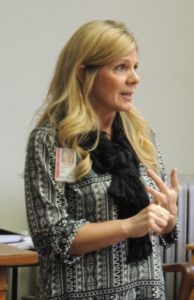(Edited April 6 re: public health providing home services when not covered by insurance)
The Greene County supervisors listened to what board chair John Muir referred to as “Public Health 101” at a special meeting March 29. Presenter was Heather Bombei, a regional community health consultant with the Iowa Department of Public Health.
Greene County public health director Becky Wolf, RN, also presented at the meeting.

Per the Code of Iowa, the county is obliged to provide public health services. Greene County has contracted with Greene County Medical Center to provide those services for many years. Muir said the county can be proud of the services provided, but a request by the medical center to significantly increase the tax dollars allocated to public health has caused the supervisors to consider other options.
The special meeting with Bombei was informational only. She started by explaining that 37 counties, including Greene, Carroll and Boone, have health-system based public health departments. The other 62 counties operate their own public health department with direct governance by a local board of health.
Funding for public health changed greatly when Greene County Medical Center decertified as a provider of home health care two years ago. Without the certification, the public health department cannot bill Medicare or Medicaid for home health services. There are 30 local public health agencies (including Greene County) that do not provide certified (ie Medicare/Medicaid reimbursed) home care.
Bombei assured the supervisors that many counties are now looking more closely at public health. She cautioned that among counties, it is very difficult to find accurate comparisons. She also said there is an increase in public agencies that are decertifying.
She said that historically, hospital-based systems cost more than county-based systems because with a hospital-based system, expenses for the entire system, which operates 24/7, are included in indirect costs for public health.
Supervisor Dawn Rudolph, who replaced Guy Richardson on the county board of health, said the indirect costs being assessed to the county is one of the bigger problems she sees with the current hospital-based system. “We’re paying indirect costs 24/7 for a program that doesn’t run 24/7,” she said.
Bombei said a challenge faced by rural counties is that in the absence of a local office of the Department of Human Services, the public health department often serves as a resource for concerns that don’t specifically pertain to health. The HOPES (Healthy Opportunities for Parents to Experience Success) program for young families is an example. The public health department helps build parenting skills and provides ongoing screening for children to be sure any developmental lags are assessed and dealt with before they become more serious. In cities, DHS provides that type of service.
“When we look at the numbers we’ve been given for the future, we can’t do it,” Muir said about continuing with the hospital-based system. “We recognize the benefits of being hospital-based, but we need to make some hard changes.”
Bombei recommended that the board of health and the county supervisors 1) do strategic planning and determine what services should be provided and how they should be provided; and 2) have a written agreement with the medical center of what will be provided for the $200,000 the county has allocated for public health in the next fiscal year. She suggested the supervisors and board of health work toward better communication and continue gathering facts.
Wolf also provided information. She said the medical center decertified home care when the mandated reporting increased to where additional staff would have been needed just to keep up. She said the patient load wasn’t large enough and new clients were being referred. “We just didn’t have the volume to support home care anymore,” Wolf said.
Wolf provided a detailed breakdown of staff hours. Although public health can no longer bill Medicare or Medicaid for home care, it is still the second largest service area. Wolf used as an example a person who needs home care services more weeks than Medicare will pay for it. The person would become a public health client at the time there was no longer Medicare funding. Public health would provide the service on a sliding fee scale dependent on the client’s ability to pay. Public health uses grant funds to costs not paid by the client.
The HOPES program is the largest service line except for administration.
Wolf said it has become more difficult to find grant funds that don’t require additional staff time to implement or evaluate them. She admitted that the supervisors have valid points when they express concern about funding indirect costs and the need to find possible ways to reduce overall costs.
